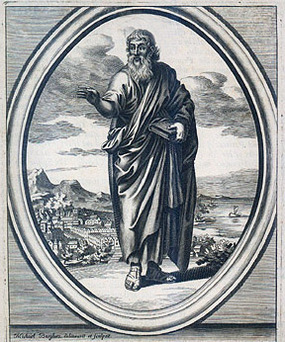 Engraving by Michael Burghers, ca 1685
Engraving by Michael Burghers, ca 1685 Polycarp’s life and teaching is well documented in a number of sources, and a letter written by him to the Christians at Philippi has also survived. These historical documents all show Polycarp to have been a believer of great faith and a defender of the faith “once delivered.”
According to Irenaeus, Polycarp actively resisted many ideas that had already entered parts of Christianity by the second century. In the 150s or 160s, Ireneaus tells us, Polycarp visited Rome to discuss a number of differences that already existed between the churches in Asia and Rome. Many of these differences were resolved, though some were not. For example, Polycarp and his followers celebrated the “Christian Passover” on the 14th of Nisan, the day of the Jewish Passover, whatever day this fell on, while the Roman church followed the practice of celebrating Easter always on a Sunday around that same time of year.
But it is because of his martyrdom that Polycarp is now best remembered. The story is preserved in The Martyrdom of Polycarp which is a letter sent from the church of Smyrna, after his death, to surrounding churches. The Martyrdom is considered to be one of the earliest actual accounts of a Christian martyrdom outside the New Testament and records eye witness accounts of Polycarp’s execution.
The account also gives us many details regarding Polycarp and his faith. It recounts that Polycarp was betrayed by a young man and that around the time of the evening meal on a Friday the police and other armed men came to arrest Polycarp – an old man of at least 86 – for refusal to worship the emperor. Polycarp is said to have affirmed “God’s will be done,” and called for a meal for those who had come to arrest him. He asked to be allowed to pray a while and was then led away. The document states that as Polycarp was being taken into the arena where he would be executed, a voice spoke the words, “Be strong, Polycarp and act the man!” The Martyrdom continues to say that no one saw who had spoken, but “our brothers who were there heard the voice.”
Polycarp was given an opportunity to recant his beliefs. He was told to repent and instructed to say, “Down with the Atheists!” (meaning those who did not believe in the Roman gods) at which Polycarp looked at the crowd in the stadium, and gesturing towards them, said, “Down with the Atheists!” Refusing a final opportunity to deny his faith, Polycarp was burned at the stake, though the Martyrdom insists he finally was killed with a sword as the flames did not seem to burn him.
But Polycarp’s tenacity to the beliefs he had learned from the apostles was of great importance in establishing Christianity before the persecutions against Christians finally subsided. In his letter to them, he had urged the Philippians to hang on to their faith despite everything, reminding them: “Stand fast, therefore … and follow the example of the Lord, being firm and unchangeable in the faith.”
 RSS Feed
RSS Feed
